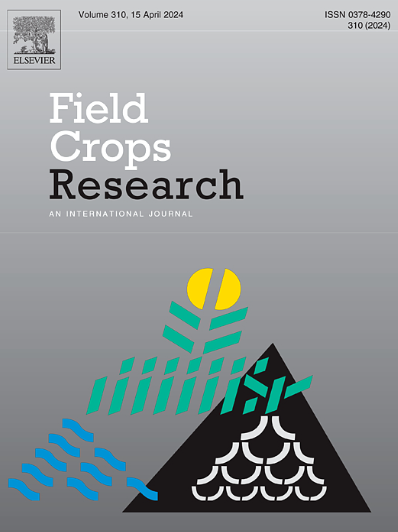交替湿润和干燥可保持水稻产量并降低全球变暖潜势:全球荟萃分析
IF 5.6
1区 农林科学
Q1 AGRONOMY
引用次数: 0
摘要
背景水稻生产系统是温室气体(GHGs)(即甲烷(CH4)和一氧化二氮(N2O))人为排放的重要来源。在水稻中实行交替湿润和干燥(AWD)会极大地影响水稻产量以及稻田的甲烷(CH4)和一氧化二氮(N2O)排放量。然而,由于这些研究的做法、实验设计、地点、土壤性质和农业生态区域各不相同,因此很难通过单个实验来确定其对全球的影响。本文的目的包括:(i) 在各种气候条件和初始土壤特性的背景下,对 AWD 对水稻产量、温室气体排放量、全球升温潜能值 (GWP) 和温室气体排放强度 (GHGI) 的影响进行全球综合分析;(ii) 探讨 AWD 条件下不同农艺措施对水稻产量和温室气体排放量的影响。方法在这项研究中,我们分析了全球 72 项经同行评审的研究,这些研究深入探讨了 AWD 条件下气候、初始土壤条件和农业管理措施对水稻产量、温室气体、全球升温潜能值和温室气体总指数的影响。此外,区域气候因素和土壤特性对水稻产量和 GWP 有很大影响,例如,年平均气温低(≤ 15℃)和降水量少(≤ 1000 毫米)有利于提高 CH4 和 GWP 的减排潜力。此外,在 pH 值≤ 6.5、有机碳含量≤ 12 g kg-1、全氮含量≥ 2 g kg-1、可利用氮、磷和钾含量高的土壤中,AWD 对 GWP 的降低幅度最大。总体而言,在氮肥施用量为 100-150 kg hm-2 以及使用高效肥料、深施肥和施用生物炭的情况下,水稻产量提高,温室气体、全球升温潜能值和温室气体指数降低。结论因此,应根据当地条件采取适当的农艺措施,以实现温室气体排放量最低的可持续水稻生产。本文章由计算机程序翻译,如有差异,请以英文原文为准。
Alternate wetting and drying maintains rice yield and reduces global warming potential: A global meta-analysis
Context
Rice production systems are significant sources of anthropogenic emissions of the greenhouse gases (GHGs) i.e., methane (CH4) and nitrous oxide (N2O). Practicing alternate wetting and drying (AWD) in rice substantially affects rice yield as well as CH4 and N2O emissions from rice fields. However, it is difficult to determine global impacts from individual experiments as these studies differ in practice, experimental design, locations, nature of soil, and agro-ecological regions.
Objective
The objectives of this article include (i) to conduct a global and comprehensive analysis to clarify the effects of AWD on rice yield, GHGs emissions, global warming potential (GWP), and greenhouse gas emission intensity (GHGI) in the context of a variety of climatic conditions and initial soil properties, and (ii) to explore the effects of different agronomic measures on rice yield and emissions of GHGs under AWD.
Method
In this study, we analyzed 72 peer-reviewed studies worldwide that provide insights into the effects of climate, initial soil conditions, and agricultural management practices on rice yields, GHGs, GWP, and GHGI under AWD conditions.
Results
The results found that AWD led to 1.52 % increase in rice yield with a 42.59 % increase in N2O emissions, however, CH4, GWP, and GHGI were reduced by 43.23 %, 36.84 %, and 38.57 %, respectively. Moreover, regional climatic factors and soil properties substantially affects the rice yield and GWP e.g., low mean annual temperature (≤ 15℃) and precipitation (≤ 1000 mm) are conducive for emission reduction potential of CH4 and GWP. In addition, AWD reduced GWP highest in soils having pH ≤ 6.5, organic carbon content ≤ 12 g kg−1, total nitrogen ≥ 2 g kg−1, and high available N, P and K contents. Overall, rice yield improvements with decreased GHGs, GWP and GHGI were observed at 100–150 kg hm−2 N fertilizer application rate, and the use of enhanced-efficiency fertilizers, deep fertilization, and biochar application. Furthermore, AWD increased economic benefits and energy use efficiency through the reduction of costs and energy losses associated with irrigation.
Conclusions
Thus, appropriate agronomic measures should be taken according to the local conditions for sustainable rice production with minimum emissions of GHGs.
求助全文
通过发布文献求助,成功后即可免费获取论文全文。
去求助
来源期刊

Field Crops Research
农林科学-农艺学
CiteScore
9.60
自引率
12.10%
发文量
307
审稿时长
46 days
期刊介绍:
Field Crops Research is an international journal publishing scientific articles on:
√ experimental and modelling research at field, farm and landscape levels
on temperate and tropical crops and cropping systems,
with a focus on crop ecology and physiology, agronomy, and plant genetics and breeding.
 求助内容:
求助内容: 应助结果提醒方式:
应助结果提醒方式:


